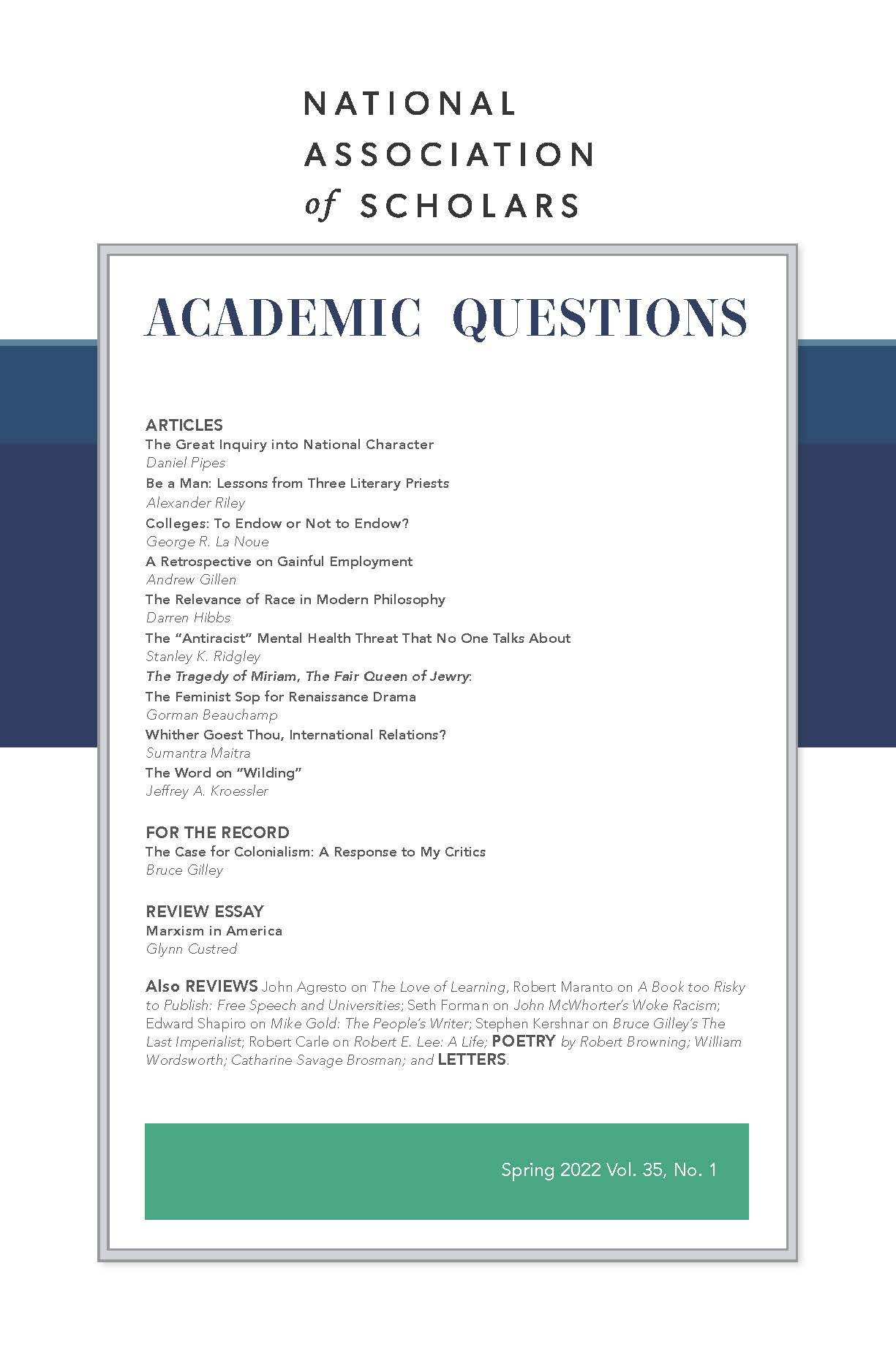Carol Iannone is editor-at-large of Academic Questions, 420 Madison Ave., 7th Floor, New York, N.Y. 10017; [email protected].
Toward the end of a recent webinar from the National Association of Scholars, “The Anatomy of a Diversity, Equity, and Inclusion Takeover,” participant Joel Gardner—attorney, board member at the University of Virginia, and member of the UVA Committee on Free Expression and Free Inquiry—reported moments of utter amazement that he experienced in discussing the effects of the DEI regime on campus. He noted to senior administrators that under the new dispensation, individuals from some groups—white men, for example, or fundamentalist Christians—are being “marginalized,” to use the current jargon. The response was, that’s o.k., other groups were marginalized in the past, different groups are marginalized today. Evidently this was to be seen as a form of justice, perhaps of the biblical kind, in compensation for the “sins of the fathers” (a policy, incidentally, later rescinded by God in the Old Testament). Gardner was stunned in more than one conversation to find that “people running major universities actually believe that.” He insists on the contrary that considerations of individual merit and content of character must be our criteria for judgment, not group grievance and identification.
I have had similar experiences in email discussions and in person and was equally startled to find academics and professionals who have accepted that white men, especially, deserve their negative treatment under affirmative action today, since white men of the past had, in this telling, enjoyed special advantages. Furthermore, since white men now continue in so many prestigious areas where they are still “overrepresented,” discrimination against them, even those of them born decades after the age of segregation, is justified. As one participant said in so many words, it may go too far sometimes, but I’m not going to cry over it. Notice that the official rationale for “diversity” as set forth in the lamentable series of Supreme Court decisions that have blighted higher education in our time—that diversity enriches the educational experience—is completely forgotten by our latter-day Mesdames Defarge.
Would anyone ever have expected such a swift undoing of bedrock American principles based on equality of individuals before the law to disappear among educated, thinking people in a generation or two? Instead of equality, which properly means political and civic equality before the law to be enjoyed by individuals, we now have “equity,” the segmentation of the entire population into groups, or “communities,” to use the jargon word, and the demand for proportional representation of each group in all desirable areas. Aside from the artificiality of this group segmentation, detailed by Mike Gonzalez in The Plot to Change America: How Identity Politics is Dividing the Land of the Free (2020), this notion of justice demands that all “groups” should not only be proportionally represented in all desirable areas, but would have been so in the past, sans discrimination, thus supposedly justifying compensatory preferences now. (In the galloping progressivism of today, there is already a push to go beyond proportionality and to diminish white men even further, but let us stay on point.). A movement that began with the “promissory note” implied in the Declaration of Independence, “that all men are created equal, that they are endowed by their Creator with certain unalienable rights, that among these are Life, Liberty and the pursuit of Happiness,” has turned into a mortgage impossible ever to pay off.
Just as the postmodernist denial of truth is contingent on the existence of truth, so the woke denial of American principles is contingent on those very principles. Consequently, some conservatives accept woke premises in a spirit of generosity toward the opposite side. Thus, even as Gardner reports his shock at the primitive vengeance his purportedly educated interlocutors are unembarrassedly calling justice, he goes out of his way to acknowledge that there was “marginalization” at UVA when he attended fifty years ago, since women were not admitted to most of its schools. But women had plenty of opportunity for higher education in the Sixties and Seventies; the wokish concept of marginalization is far vaster and more fraudulently comprehensive than what Gardner is remembering, and it does no good to make it seem that they are in any way the same. How people lived life in the past, how they defined good for themselves, what opportunities they had and how they pursued them is much too complex for the reductive characterizations pushed by the all-encompassing Marxist-laden ideology of oppression and marginalization, perhaps particularly regarding women. Remember, the woke standard being waved is that all groups as presently defined should have been proportionally represented in all areas. The entire past has to be denied any integrity whatsoever.
Likewise, in an article in Forbes, Richard Vedder writes cogently about the importance of individual merit in maintaining the reputation of our institutions of higher education, and defends standardized tests as valid indicators of college readiness, but then comes to a puzzling conclusion. “There may be a trade-off here,” he suggests, “achieving full socioeconomic, racial and ethnic diversity may be possible only by sacrificing high academic standards . . . Perhaps this is a price we should pay to right past injustices— but there is a price.”
Is Vedder implying that we could actually achieve “full socioeconomic, racial, and ethnic diversity,” if only we would agree to sacrifice high academic standards? Assuming that present-day inequalities are due to past injustices is in no way straightforwardly clear, and neither is the idea that past injustices can actually be paid for in the present, especially by lowering academic standards and creating new injustices.
Vedder’s gentlemanly expansiveness, like Gardner’s, their willingness to grant some validity to their opposition’s arguments, will gain no credit in reasoning with the progressive left. We think we’re playing an honest game with progressivism, within some structure of rules and evidence, only to find again and again that it uses the system only opportunistically; otherwise it’s by any-means-necessary. Remember, affirmative action was intended to increase access to the goods of higher education to greater numbers of deserving students, only to eventuate in rigid quotas, the diversity takeover, and the evisceration of the liberal arts.
When Biden announced that he was seeking a black woman to nominate to the Supreme Court, some protested that it was a mistake to so openly announce the crude guidelines the left intends to inflict across the board, from high to low. Was it a misstep or was it a way of affirming that this is the way of things now? After all, he could have achieved that goal without being so blatant about it.
Andrew McCarthy noted another outrage against common standards when Biden nominated an unreconstructed Marxist to be comptroller of the currency, risking voters’ wrath at the ballot box. Saule Omorova’s nomination was eventually withdrawn but McCarthy observed:
Losing elections is a cost of doing business. For the Left, the point is to exploit election wins by issuing radical decrees and taking hard votes that usher in statist policies and drastic cultural change. Yes, it will be unpopular and will probably cost Democrats control of Congress or the White House for a cycle, or a few cycles. But based on long experience, Democrats are betting that Republicans will never even try to roll back the tide. In the meantime, the leftists who lose their elected and appointed posts will be handsomely rewarded—with board memberships, think-tank fellowships, academic perches, top executive positions in ever-more-woke corporate America, and so on. In no time flat, Republicans will stumble, the public will forget, Democrats will gradually win back control of the government, and the cycle will repeat itself.
McCarthy concludes, “While we ask why the Left would risk so damaging its electoral hopes by nominating Marxists for top jobs” —or, we might interject, why the Left would risk alienating voters who believe in merit rather than race and gender as criteria for the Supreme Court—“the Left laughs . . . and transforms our society.”
Conservatives are celebrating the coming Republican victories in November. Let’s hope that Republicans will do more than admire each other and enjoy being the majority again, while the Democrats bask in how much they have furthered the progressive vision.
Meanwhile, we preserve our vision of our society, civilization, culture, and intellectual standards in the pages of AQ. We have both practical and ruminative articles in this issue: the more applicative pieces follow the more meditative ones listed below.
The meditative pieces:
—In “The Relevance of Race in Modern Philosophy,” Darren Hibbs carefully considers whether ideas now deemed objectionable held by philosophers in the past have bearing on their theoretical contributions.
—In “The Tragedy of Miriam, The Fair Queen of Jewry: The Feminist Sop for Renaissance Drama,” Gorman Beauchamp drily evaluates the effort to increase female representation among the male authors of the period.
—“The Great Inquiry into National Character” by Daniel Pipes is a fascinating description and analysis of the heyday of this particular academic approach within the social sciences.
—The indispensable Glynn Custred reviews books by Mark Levin and David Horowitz in his review essay, “Marxism in America.”
—Sumantra Maitra describes how the field of International Relations is yielding to academic frivolity in "Whither Goest Thou, International Relations?”
—"The Case for Colonialism: A Response to My Critics” is reprinted in For the Record and amounts to Bruce Gilley’s exposure of the utter bankruptcy of colonial studies.
The applicative pieces:
— George R. La Noue advises how to prevent your donations to colleges from feeding DEI against your will, in “Colleges: To Endow or Not to Endow?”
—In “A Retrospective on Gainful Employment,” Andrew Gillen explains how the set of federal regulations called “Gainful Employment” designed to make colleges more accountable for student debt could be refitted for use today.
—In “The ‘Antiracist’ Mental Health Threat That No One Talks About,” Stanley K. Ridgley exposes the destructive cult-like methods of so-called antiracist training.
—Jeffrey A. Kroessler shows how faulty scholarship and biased information unthinkingly passes into digital reference works and databases, in “The Word on ‘Wilding.’”
Photo by Max Anderson on Unsplash













